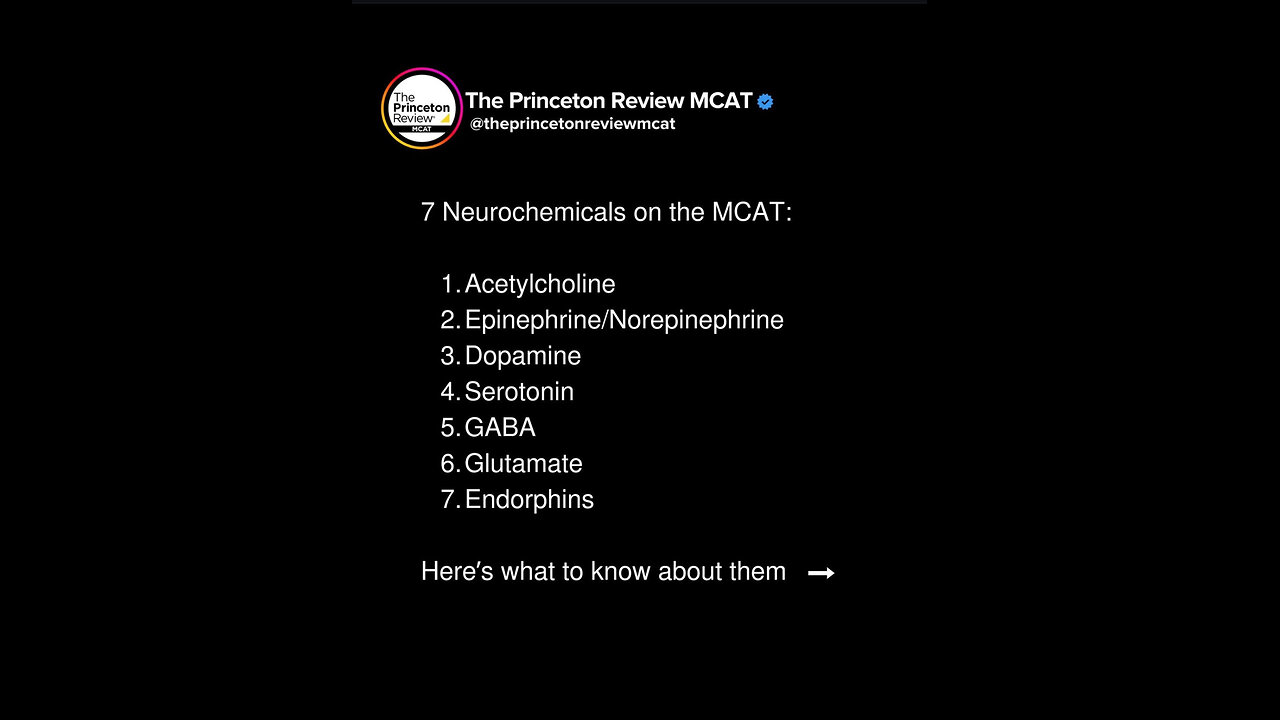Premium Only Content

The Essential Neurochemicals: The Pillars of Brain Function and Human Behavior
The human brain, one of the most complex structures in the known universe, functions through the intricate interplay of neurochemicals, also known as neurotransmitters. These chemicals are essential for regulating a broad spectrum of physiological processes and behaviors, ranging from basic motor functions to complex emotional regulation and cognitive processing. Understanding these key neurochemicals—Acetylcholine, Epinephrine/Norepinephrine, Dopamine, Serotonin, GABA, Glutamate, and Endorphins—provides deep insights into how the brain operates, how mental health is maintained, and how various disorders may emerge when these systems become imbalanced.
### **1. Acetylcholine: The Catalyst of Cognitive and Neuromuscular Integration**
Acetylcholine is a fundamental neurotransmitter in the brain and body, playing a pivotal role in voluntary muscle control, attention, learning, and memory. Its importance extends into the autonomic nervous system, particularly within the parasympathetic branch, where it helps regulate functions during rest, such as lowering heart rate and promoting digestion.
In the brain, acetylcholine is critical for cognitive functions, particularly in areas like the hippocampus, which is essential for memory formation. Research has shown that disruptions in acetylcholine pathways are closely linked to cognitive decline, particularly in neurodegenerative diseases like Alzheimer’s, where memory and learning capacities are severely impaired. This highlights the neurochemical’s central role not just in cognition, but in maintaining overall neurological health.
### **2. Epinephrine and Norepinephrine: The Dynamic Duo of Stress Response and Alertness**
Epinephrine (adrenaline) and norepinephrine are closely related neurotransmitters that are integral to the body’s response to stress. These neurochemicals prepare the body to confront threats through the "fight-or-flight" response by increasing heart rate, redirecting blood flow to essential muscles, and enhancing focus and alertness.
Beyond their role in immediate stress responses, epinephrine and norepinephrine also influence mood regulation and arousal levels. Chronic imbalances in these chemicals are implicated in mood disorders such as anxiety and depression, as well as conditions related to chronic stress. Understanding the nuanced roles of these neurotransmitters is crucial for comprehending how the body manages stress and the long-term impacts of stress on mental and physical health.
### **3. Dopamine: The Driver of Motivation, Reward, and Motor Function**
Dopamine is a versatile neurotransmitter central to the brain’s reward system, influencing motivation, pleasure, and reinforcement learning. It is also critically involved in motor control, particularly in regulating voluntary movements and ensuring smooth coordination.
Dysregulation of dopamine has been linked to several neurological and psychiatric disorders. For example, Parkinson’s disease, characterized by motor dysfunction, results from the degeneration of dopamine-producing neurons in the brain’s substantia nigra. Conversely, excess dopamine activity is associated with schizophrenia, where it contributes to symptoms such as delusions and hallucinations. Dopamine’s broad influence underscores its importance in both everyday functioning and the pathology of various mental health conditions.
### **4. Serotonin: The Regulator of Mood, Sleep, and Homeostasis**
Serotonin plays a crucial role in regulating mood, emotional well-being, sleep, and appetite. Often referred to as the brain’s natural mood stabilizer, serotonin helps to maintain emotional balance and is involved in the regulation of the body’s sleep-wake cycle.
Imbalances in serotonin levels are strongly associated with mood disorders such as depression and anxiety. The use of selective serotonin reuptake inhibitors (SSRIs), a common class of antidepressants, highlights the critical role of serotonin in mood regulation. Beyond its influence on mood, serotonin also impacts various physiological processes, such as appetite control and the modulation of pain, making it a key neurochemical for both mental and physical health.
### **5. GABA (Gamma-Aminobutyric Acid): The Brain’s Inhibitory Modulator**
GABA is the brain’s primary inhibitory neurotransmitter, essential for maintaining a balance between excitation and inhibition within the nervous system. By inhibiting excessive neuronal activity, GABA helps to prevent overstimulation, which can lead to conditions such as anxiety, seizures, or other neurological issues.
GABA’s role in promoting relaxation and reducing stress is vital for mental health. Low levels of GABA are linked to anxiety disorders, insomnia, and epilepsy, where the brain’s inability to regulate neural activity results in heightened stress and uncontrolled neural firing. The function of GABA illustrates the importance of inhibitory processes in maintaining mental and emotional stability, highlighting its role as a critical modulator within the nervous system.
### **6. Glutamate: The Brain’s Primary Excitatory Neurotransmitter**
Glutamate is the most abundant excitatory neurotransmitter in the brain, playing a key role in synaptic plasticity, learning, and memory formation. It facilitates communication between neurons, promoting cognitive functions and information processing.
However, while glutamate is essential for normal brain function, excessive glutamate activity can lead to neurotoxicity and cell death. This overactivity is implicated in several neurodegenerative conditions, such as Alzheimer’s disease and amyotrophic lateral sclerosis (ALS), as well as epilepsy. The balance between glutamate and inhibitory neurotransmitters like GABA is crucial for preventing overstimulation and ensuring the brain functions optimally.
### **7. Endorphins: The Body’s Natural Painkillers and Mood Enhancers**
Endorphins are neuropeptides that function as the body’s natural pain relievers, providing a sense of euphoria and reducing the perception of pain. Released in response to stress, exercise, and pleasure, endorphins play a significant role in promoting well-being and enhancing emotional resilience.
The release of endorphins during activities such as physical exercise or social bonding underscores their role in mental health. Endorphins help the body to endure pain and stress, contributing to a sense of euphoria and overall well-being. Their role in managing pain and promoting positive emotions is critical, providing insight into how the body’s natural mechanisms can be harnessed for therapeutic purposes.
### **Interdisciplinary Context and Advances**
### **1. Neurochemical Interactions Across Neural Circuits**
Neurochemicals do not function in isolation; they interact across various neural circuits to shape behavior, cognition, and emotional states. For instance, the dopaminergic system is not only involved in reward and pleasure but also intersects with the serotonergic and GABAergic systems to modulate mood and anxiety levels. This interaction highlights the complexity of brain function and the importance of a holistic understanding of neurochemical dynamics.
### **2. Neuroplasticity and Epigenetics**
Neurochemicals play a crucial role in neuroplasticity, the brain’s ability to reorganize itself by forming new neural connections. This process is heavily influenced by experiences, learning, and environmental factors. Moreover, epigenetic mechanisms—how environmental factors can influence gene expression—also affect neurotransmitter production and receptor sensitivity. Understanding the interplay between neurochemistry and epigenetics is essential for developing personalized approaches to mental health treatment.
### **3. Therapeutic Implications and Future Directions**
The growing field of personalized medicine in neuropsychopharmacology offers promising avenues for treatment. By tailoring interventions based on an individual’s genetic profile and neurochemical balance, clinicians can develop more precise treatments for mental health disorders. Emerging therapies, such as deep brain stimulation and psychedelic-assisted psychotherapy, also show potential in targeting specific neurochemical systems to alleviate conditions like depression and Parkinson’s disease.
### **Conclusion: The Integrated Role of Neurochemicals in Human Behavior**
Understanding the essential neurochemicals of the brain provides a comprehensive view of how our behavior, emotions, and cognitive functions are regulated. The interplay of these neurochemicals, along with the influence of genetics and environment, underscores the complexity of brain function and the importance of maintaining neurochemical balance for mental health. Continued research into these systems not only advances our knowledge of the brain but also opens new pathways for innovative treatments and interventions that can enhance human well-being and quality of life.
-
 24:01
24:01
Winston Marshall
4 days agoThe TRUTH About The UK Farmer Protest What No One Is Talking About...
51.1K150 -
 3:21:56
3:21:56
Tate Speech by Andrew Tate
12 hours agoEMERGENCY MEETING EPISODE 93 - ME TOO!
208K144 -
 3:21:42
3:21:42
FRENCHY4185
8 hours agoPRESTIGE AND CAMO GRIND : BLACK OPS 6
49.5K -
 1:29:47
1:29:47
Real Coffee With Scott Adams
8 hours agoEpisode 2669 CWSA 11/24/24
67.6K28 -
 13:52
13:52
Hershberger's Kitchen
19 hours agoTwo Delicious Dip and Spread Recipes to Try, Inspirational Thought
66.4K5 -
 3:41:05
3:41:05
Sacred Sage
11 hours ago $4.46 earnedDaz3D: Attempting to Finish Zoe Conversation!
51.6K5 -
![[Stream #19 ] Gaming, Chatting, you know the drill!](https://1a-1791.com/video/s8/1/W/f/M/4/WfM4u.0kob-small-Stream-19-Gaming-Chatting-y.jpg) 8:14:24
8:14:24
OneRandomDolly
8 hours ago[Stream #19 ] Gaming, Chatting, you know the drill!
64.1K4 -
 11:07
11:07
TimcastIRL
1 day agoElon Musk Suggests He’ll BUY MSNBC, Joe Rogan Will REPLACE Rachel Maddow
85.5K111 -
 34:24
34:24
The Rubin Report
1 day agoFormer CEO: The Aftermath of Vice Media & What's Next for Mainstream Media | Shane Smith
98.9K74 -
 9:14:23
9:14:23
tacetmort3m
2 days ago🔴 LIVE - BECOMING THE UNTOUCHABLE (RADIATION WHO?) - STALKER 2 - PART 3
43K6